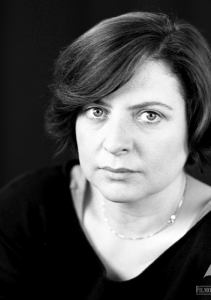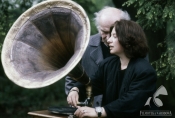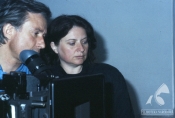Magdalena Łazarkiewicz

Film and theatre director, screenwriter. She was born June 6, 1954, in Warsaw. An alumna of Cultural Studies at the University of Wroclaw (specialising in theatre studies), from which she graduated in 1976, and Directing Department at the Faculty of Radio and Television of the University of Silesia in Katowice (1982). For two years, she was the literary director of the Jaracz Theatre in Olsztyn (1977-1978). She started out as a director of documentary films (including Nostalgia, 1983).
In 1985, she made the moving naturalistic TV film Przez dotyk/By Touch, which confronted two women and their extreme attitudes to the will of life – the terminally ill Teresa and the young Anna. The film received many awards, including the Grand Prix at the Women’s Film Festival in Creteil. Later, she directed two feature films: Ostatni dzwonek/The Last Bell (1989), about a group of young people who oppose the regime set in a 1980s school, and Odjazd/Departures (1991, co-directed with Piotr Łazarkiewicz), about Polish attitude to people living in the formerly German lands on the example of two Mazury women – mother and daughter. The film won the Grand Prix of the Jury at the Polish Film Festival in Gdynia. A year later, she directed Białe małżeństwo/White Marriage (1992), based on the play by Tadeusz Różewicz – a visually sophisticated film about erotic non-fulfilment, set in the atmosphere of fin-de-siécle. Her 1997 television film, Drugi brzeg/Another Shore, told the story of the last days of the poet Heinrich von Kleist. Then, she made Na koniec świata/The End of the World (1999), inspired by the novel by Emile Zola, starring Justyna Steczkowska. She also collaborated with her sister Agnieszka Holland on the set of the TV series Ekipa/Prime Minister (2007), set in government spheres. In the 1990s, she returned to documentaries (Bez klucza. Portret Hanny Suchockiej/Without the Key. Portrait of Hanna Suchocka, Żwirowisko – ostatnia niedziela /Gravel Pit – Last Sunday, about the conflict between Poles and Jews regarding the cross established in Auschwitz-Birkenau). In 2011, she wrote and directed the TV series Głęboka woda/Deep Water about employees and charges of the social welfare centre (the Prix Italia Award and Prix Europa in Berlin).
She has worked for television drama on many occasions. She directed Dom kobiet/The House of Women by Zofia Nałkowska, When She Danced by Martin Sherman, and Klaras Verhältnisse/Klara’s Case by Dea Loher. In 2003, she directed Mascagni's opera Cavalleria Rusticana for the Grand Theatre in Łódź. At Powszechny Theatre in Warsaw, she directed Three Tall Women, at Praga Nowy Theatre – Glass Collection based on Glass Menagerie by Tennessee Williams, and at the Studio Theatre – Dowcip/Wit by Margaret Edson.
Since 2011, she has served as artistic director of the International Film Festival "Jewish Motifs" in Warsaw.
Sister of Agnieszka Holland, mother of the composer Antoni Łazarkiewicz. She was married to director Piotr Łazarkiewicz (d. 2008)
Selected filmography
-
1992
WHITE MARRIAGE






